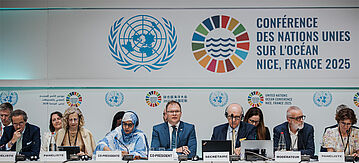With the adoption of the Nice Ocean Action Plan, the international community has committed to ambitious marine conservation and protection at the UN Ocean Conference in Nice, which ends today. The German government saw the conference in Nice as a platform to successfully push for faster progress in marine conservation and protection: for example, more countries now support a precautionary pause to protect the deep sea from commercial mining, the BBNJ Agreement is about to enter into force with the necessary support and the group of countries favouring an effective agreement is growing in the run up to the upcoming negotiations on a global plastics agreement.
Federal Environment Minister Carsten Schneider remarked: “The high seas are not the Wild West. Rules for protecting our shared environment also apply there. This was clearly underscored at the UN Ocean Conference in Nice. This conference saw significant progress in ocean action despite the difficult geopolitical situation. More countries than ever before took a clear stance against deep-sea mining because simply too little is known about the potential damage. We also agreed with partner countries in Africa, Asia, the Pacific and Latin America to jointly develop and propose marine protected areas on the high seas. The next crucial phase of marine conservation and protection will happen in August when a new agreement to combat the flood of plastic waste in our seas and oceans will be negotiated.”
The conference in Nice also sent a strong message on protecting the deep sea from commercial mining: as many as 37 nations including Germany support a precautionary pause. This is important because we still know far too little about the deep sea to eliminate the possibility of environmental damage caused by commercial exploitation.
The German government pledged to implement a wide range of measures in Nice. For instance, up to 2031, the Federal Action Plan on Nature-based Solutions for Climate and Biodiversity is providing 100 million euros for the conservation and restoration of salt marshes, seagrass meadows and kelp forests in the North and Baltic Seas. This will strengthen the ability of the seas to store carbon and their resilience. Another example is the world’s first programme to recover and destroy legacy munitions from the seas, which met with considerable interest in Nice. With this programme, Germany is leading the way in the North and Baltic Seas. Germany will share the knowledge gained from the first trial recovery activities and from the construction of an industrial recovery and disposal platform with other countries facing similar challenges.

